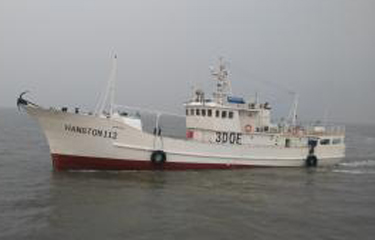A Fijian commercial fishing vessel has received a withhold release order from U.S. Customs and Border Protection (CBP), which claims forced labor may have been employed onboard the longliner.
The order requires all U.S. agencies to detain tuna and other seafood harvested by the Hangton No. 112, which is owned and operated by Suva, Fiji-based Hangton Pacific Co.
In a 4 August press release, the CBP said it had identified at least three of the International Labor Organization’s 11 indicators of forced labor during an investigation of the vessel’s operations: withholding of wages, debt bondage, and retention of identity documents.
“Foreign fishing vessels like the Hangton No. 112 continue to lure vulnerable migrant workers into forced labor situations so that they can sell seafood below market value, which threatens the livelihoods of American fishermen,” CBP Acting Commissioner Troy Miller said. “CBP will continue to stand up against these vessels’ abusive labor practices by preventing the introduction of their unethically-harvested seafood into the U.S. market.”
Hangton Pacific Co. owns a fleet of longliners fishing for yellowfin and bigeye tuna in Fijian and international waters. It also purchases product from foreign-owned vessels calling into Suva, where it operates a processing plant. It specializes in fresh and frozen tuna and exports more than 95 percent of its products, primarily to the United States and Japan, but with additional quantities sent to Taiwan, Vietnam, Sri Lanka, and Thailand. The company won the Westpac Prime Minister’s Fisheries Exporter of the Year award in 2014, and received financial support from a government fund aimed at financially assisting Fiji’s tuna industry in 2017.
According to the Fiji Sun, Hangton Pacific is a supplier of tuna to the Pacific Fishing Company Pte Limited (PAFCO) canning facility in Levuka, Fiji, which has a processing agreement with Bumble Bee Seafoods.
The U.S. CBP has stepped up enforcement against fishing vessels operating in the Pacific Ocean that it has accused of using forced labor. In August 2020, it placed a WRO on all seafood harvested by the Taiwanese-owned, Vanuatu-flagged fishing vessel Da Wang “due to reasonable suspicion of forced labor on the vessel.” In January, it issued an order against the Lien Yi Hsing No. 12, a Taiwanese-flagged and -owned distant-water fishing vessel. In May, the Yu Long 2 was the subject of a WRO, effectively barring the vessel’s catches from entering the United States. And in June, the Dalian Ocean Fishing Company was hit with a WRO.
“The International Labor Organization estimates that 25 million workers suffer under conditions of forced labor worldwide. The distant-water fishing industry is at high risk of forced labor as foreign companies often coerce vulnerable migrant workers to perform hazardous labor for little or no pay aboard fishing vessels that may spend months at sea without making port calls,” the CBP said in its release. “Foreign companies exploit forced labor to sell goods below market value, which hurts law-abiding businesses, threatens American jobs, and exposes consumers to making unethical purchases. Forced labor is often linked to illegal, unreported, and unregulated fishing that damages ocean ecosystems and threatens the livelihoods of law-abiding American seafood producers.”
Photo courtesy of Western and Central Pacific Fisheries Commission







